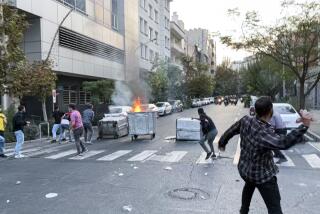Scandal Must Not Halt Policy Agenda, Weinberger Says
- Share via
WASHINGTON — Defense Secretary Caspar W. Weinberger, warning that Americans “can be our own worst enemy,” declared Thursday that foreign and domestic policy “should not be held hostage” to investigations of the Iran arms- contra aid diversion scandal.
In his most extensive discussion to date of the controversy rocking the Reagan Administration, Weinberger described the scandal as “irrelevant” to such issues as the size and content of the federal budget and continuing aid to the Nicaraguan rebels.
“A two-track policy should be established in which we continue with our vigorous legislative agenda at the same time the Iran affair is investigated,” Weinberger said in a speech to the National Press Club.
“The worst possible outcome to the Iran affair,” he added, “would be to allow its use as a weapon by opponents of the President to try to weaken his leadership of America and the free world.”
‘Sullen Recriminations’
Referring to America’s isolationism before World War II and the “sullen recriminations” after the Vietnam War, Weinberger worried aloud about possible fallout from the scandal:
“I think we should all be concerned that overreaction to the Iran controversy could lead to another dangerous period of American withdrawal, isolationism and confusion about its proper role in the world.”
Weinberger, along with Secretary of State George P. Shultz, opposed the Iran arms sales when they were first proposed as part of an Administration effort to win release of American hostages in Lebanon.
He made no mention of that opposition in his speech, and declined to discuss it in a subsequent question-and-answer session. But he defended President Reagan’s decision “to try to establish a working relationship with Iran” based on that country’s “strategic and geopolitical importance.”
Weinberger said that the United States must “consider every reasonable opportunity to secure a rational, friendly Iran” rather than sitting “on the sidelines wringing our hands and hoping that some day there will be a rational Iran, friendly to the West.”
And, in an apparent reference to Republicans in Congress and elsewhere who have criticized Reagan’s Iran decisions, Weinberger complained about “some people” who have turned “their backs on the President.”
‘Summer Soldiers’
“These ‘summer soldiers and sunshine patriots’ seem to have forgotten exactly what and who is largely responsible for the favorable turn in American policies over the last six years,” the Pentagon chief said.
In declaring that “we cannot afford to become a one-issue country,” Weinberger said that “international events will not wait for the outcome of internal studies and congressional investigations, no matter how important or necessary they are.”
As an example of “new evidence of Soviet military growth,” he disclosed that Moscow has recently completed additional bases for its new mobile SS-25 intercontinental ballistic missile and “can now support about 100 SS-25 launchers.”
Weinberger had indicated last week that the Soviets had deployed about 90 launchers for what he called “this potent new weapon . . . with great power and flexibility,” up from the previously disclosed 72 launchers.
He criticized what he called the erosion of presidential power in recent decades and said: “Were the Congress to react to the Iran affair with additional restrictions on presidential discretion, the consequences would be extraordinarily dangerous to the future of American foreign policy.”
More to Read
Sign up for Essential California
The most important California stories and recommendations in your inbox every morning.
You may occasionally receive promotional content from the Los Angeles Times.













